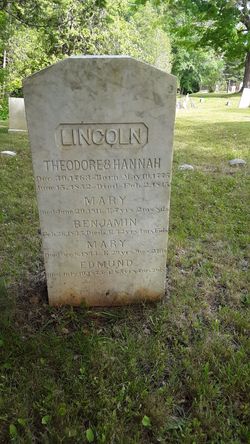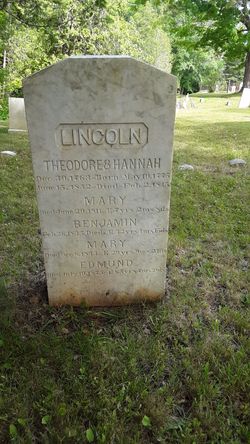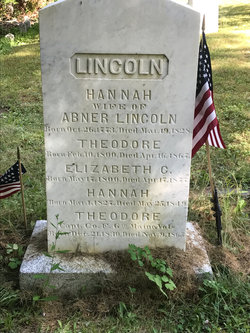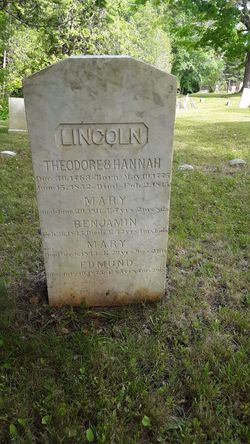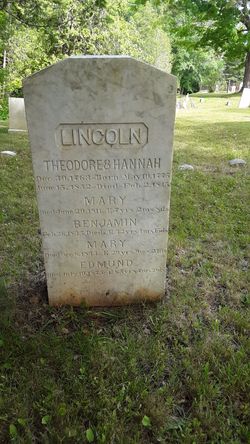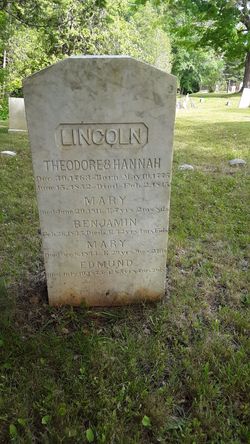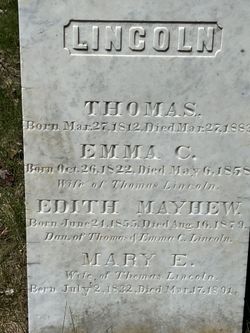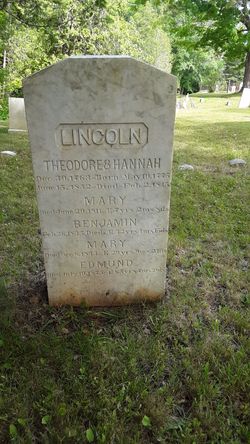| Description |
: |
1790 U. S. census: Township East of Machias, Washington County, Maine, USA.
1800 U. S. census: Township 2, Washington County, Maine, USA.
1810 U. S. census: Plantation 2, Washington County, Maine, USA.
1820 U. S. census: Dennysville, Washington County, Maine, USA.
1830 U. S. census: Dennysville, Washington County, Maine, USA.
1840 U. S. census: Dennysville, Washington County, Maine, USA.
1850 U. S. census: Dennysville, Washington County, Maine, USA.
DEATH INFORMATION:
Age at death: 88 years, 5 months, and 16 days.
The New England Historical and Genealogical Register, October 1852,...
Read More
|
1790 U. S. census: Township East of Machias, Washington County, Maine, USA.
1800 U. S. census: Township 2, Washington County, Maine, USA.
1810 U. S. census: Plantation 2, Washington County, Maine, USA.
1820 U. S. census: Dennysville, Washington County, Maine, USA.
1830 U. S. census: Dennysville, Washington County, Maine, USA.
1840 U. S. census: Dennysville, Washington County, Maine, USA.
1850 U. S. census: Dennysville, Washington County, Maine, USA.
DEATH INFORMATION:
Age at death: 88 years, 5 months, and 16 days.
The New England Historical and Genealogical Register, October 1852, Volume 6, Issue 4, page 391-392 states:
Lincoln, Hon. Theodore, Dennysville, 15 June, age 89. He was a son of Gen. Benjamin L. of Hingham; was of the class of 1785 at Harvard. There remain on the catalogue but three survivors of older date. Immediately after leaving college, he removed to Dennysville, in Maine, where he has ever since resided. He was the pioneer of the settlers in that region of Maine, which his father, General Lincoln, had carefully examined, when sent with Generals Knox and Putnam by the State of Massachusetts, in 1794, to adjust the conflicting boundary question under the treaty of 1785. Having purchased of Judge Lowell and others their titles under the grants of the Commonwealth, Gen. Lincoln sent his son, with many of his old neighbors, to plant themselves in that secluded region; and the population of Dennysville and some neighboring towns, is chiefly derived from that emigration.
The life of Judge Lincoln was useful, happy and uneventful. He was a member of the Senate of Massachusetts, for a single session, some forty years ago, but declined a re-election. He also discharged for some time the duties of Judge of Probate. For public life he had no taste. He found occupation and interest in the cultivation of a large estate, and in the society of a numerous and affectionate family, all of whom repaid his parental care with love, gratitude and good conduct. Four sons and two daughters survive him. One son and one daughter died before him. The former, the late Professor Lincoln of Burlington College, a man of distinguished scientific promise and great intellectual vigor, still freshly and fondly remembered by those who knew him, though he died too young for his fame. The home of Judge Lincoln was marked by an unassuming and generous hosptality, and by a simple and cordial tone of manners. He was himself a man of plain, penetrating good sense, earnest in business, of few words, of an affectionate temper, and upright as one of the pines upon his own hills. Of late years, his appearance and aspect presented an image of patriarchal worth and dignity. In unambitious toil and the discharge of unexciting duties, his years have glided gently away. Disease and pain hardly ever laid their touch upon his vigorous frame. He survived nearly all his contemporaries, and for many years has lived among those whom he could remember from their birth upwards and who had always been accustomed to look up to him with honor and deference.
OTHER INFORMATION:
Among the Benjamin Lincoln Papers at Boston Public Library is one written by Mary Lincoln to her brother-in-law, Theodore. The description of her letter, written 12 May 1799, includes the sentence, " TL (Theodore Lincoln) now has three titles: Capt., Esquire, & Judge." Evidently one of the titles is new. Is it "Judge"?
He was a Justice of the Court of General Sessions of the Peace beginning in October 1797, similar to a County Commissioner today (1999), and a Justice of the Circuit Court of Common Pleas for the Third Eastern Circuit ending in March 1819, also similar to a County Commissioner today (1999). The court changed its name some time between October 1797 and March 1819, but the court's function was always similar to that of County Commissioners today (1999), i.e., the court handled administrative matters relating to the operation of Washington County, as opposed to resolving legal disputes.
He was a Senator at the Court of Massachusetts in 1808, according to a family history written by Sarah Lincoln in 1932.
FAMILY HISTORY:
Family History written by Aunt Sarah Lincoln in 1932.
[Sarah Gardner Lincoln (1858-1939)]
The first of our Lincolns, Thomas [1606-1691], a cooper by trade, came from Hingham, Norfolk Co. Eng. In 1636, to Hingham, Mass. A house, occupied now by some of his descendants, Mrs. Clara Ervant and a Miss Helen Crosby, sisters, stands on the site of the original house. I am told that a part of one of the original building sat the rear is still standing, also the old flagstones. This Hingham, Mass. house is fine and large, built at different periods, with interesting woodwork, paneled rooms, large fire places, and antique furniture, some of it handsome.
Four or five generations after this Thomas, Benjamin Lincoln [1733-1810] was born in 1832 [sic.]. During the Revolutionary War he was made a Major-General, was in some important battles, was a great friend of Gen. Washington, and was selected by him to receive Lord Cornwallis’ sward through Gen. O’Hara at the surrender at Yorktown Oct. 1781. This sword, of course, was returned after the formality. (A painting of this scene, painted by Trumbull, is in the capital at Washington.) He then was made Lieut. Gov. of Mass. and latter Collector of the Port of Boston. (The old, dark secretary that stood in the south parlor in Dennysville he used in this office for his charts etc. This came to him in part payment of debts by Gen. Knox. Its final owner in the family was Edmund Lincoln [Edmund Lincoln (1870-1950)] of Great Falls, Montana. He sold this secretary in 1930.)
The history of Gen. Lincoln’s battles etc. is to be found in Jared Spark’s History of the United States. [Sparks, Jared, The Library of American Biography, Vol. XXIII, published in Boston by Charles C. Little and James Brown, 1847]
In 1783, with two other men, he made a land speculation in what was then, the District of Maine (made a state in 1820) on the boundary river, St. Croix, between this Dist. and New Brunswick. This land is what is now Perry, Pembroke and Dennysville. (Gen.) Benjamin [1763-1810] married Mary Cushing [1734-1816] from Pembroke, Mass. They had 11 children. The oldest son, Benj. [1756-1788] married Mary Otis [1756-1807], a daughter of the patriot James Otis [1725-1783]. The next son, Theodore [1763-1852], was our Dennysville ancestor. He graduated from Harvard, and in 1785 he decided to go to develop the land his father owned. This was primeval forest. Much of this land had been sold. With 15 men of different trades, he started from Boston, in a schooner, which came up through Passamaquoddy Bay, to a place called Cobscook Falls, a place of rapids and whirlpools. Leaving their vessel there, they were rowed up, by a pilot, 9 or 10 miles, to a place on the edge of the forest, where they built a camp, then a log house and began the foundations for the large house, now standing and occupied by Mrs. Arthur Lincoln [1857-1951]. (Arthur L. [1856-1926] was a grandson of this Theo, [1763-1852], his father was Thomas [1812-1883].)
They damned the river, farther up, and there built a mill. They cut the trees, sawed lumber, for the houses for the various men, and his own house, and soon were shipping lumber to Boston and other ports, in vessels from these places, which came with cargos of grain, etc. and took back return cargoes of lumber, lathes, and shingles. (This business continued in the family until 1894, when my father Benj. Lincoln [1832-1899] (son of Theo. Jr. [1800-1867]) the last manager, settled it. On account of fire and cyclone, the timber lands had dwindled and the property was worth comparatively little. The last business was called E., T., and E. C. Lincoln (Edmund [1809-1875], Thos. [1812-1883] and Elizabeth C. Lincoln [1800-1877] - Elizabeth being the widow of Theo, Jr. [1800-1867]). Our great grandfather, Theo [1763-1852], was called “Judge” as he was for awhile a judge in the Court at Machias, in 1808 was Sen. At the Court of Mass.
In the early days of his housekeeping, the Indians used to come into the house, on their way from one place to another, and they would find them rolled in their blankets, on their floor of the big kitchen before the open fire and early would hear them at their morning devotions. The doors of this Lincoln house were never locked, until perhaps late in the ‘80s. Soup and brown bread were kept on hand for the Indians and the white emigrants who would stop on their way from New Brunswick to the states.
On great grandfather's [Theodore Lincoln (1763-1852)] first trip to this new country [Washington County, Maine] they stopped with their vessel at Buck's Harbor near Machias as they were wind bound. There he saw an attractive young girl playing around her father's house. She was Hannah Mayhew. After a number of years he wanted a new housekeeper and remembering this girl, who would now be grown up, he sent for her to come. She came and when she arrived, saw the table set for one and remarked on it. The servant said "Mr. Lincoln's housekeepers do not eat at his table." She said "if I am good enough to be his housekeeper I am good enough to sit at the table with him." A place was prepared and he did not object. After a year or more she felt embarrassed at his attentions, gifts and the rides on a pillion with him to see his friends, and she decided to go home. He consented if she would come back and marry him. She agreed and returned and proved to be a wonderful wife and was admired by every one. She was said to be handsome. She came with her mother and a brother in a small vessel called "Polly" which was wrecked in Cobscock Falls, and every thing was lost, even the cow, the brother was bringing.
In the early part of g. grandfather’s Dennysville days, before he married, he used to ride to Boston on horse back to spend the winters. The plantation where he settled, he named Dennysville, from the chief of the Passamaquoddy tribe - 14 miles away - now Pleasant Point. This chief’s name was Dennys or Denis evidently called Denny by the white men. These Indians have always gone at liberty into the forests for ash for their baskets and birch bark. They were expert as river drivers and helped every year to get the logs down the rivers into the mill pond.
G. grandfather, “Judge” Theodore [1763-1852], had 8 [sic 9] children. The oldest of these was Theo. Jr. [1800-1867], my grandfather. Then came Hannah [1801-1882], who married Ichabod Chadbourne [1787-1855]. Benjamin [1802-1835] died young, studied medicine and was made a Prof. at the University of Vermont. Sarah [1807-1886] married Spencer Tinkham [1797-1872] (Aunt Sally). Bela [1805-1859] married Eliz. Rice [1813-1866] from New Brunswick. Here came in the Frosts and Devereaux. Edmund [1809-1875] was not married. He was a wonderful friend to all the family and very generous with his money. There was a daughter Mary [1804-1811; 1814-1843] who died young. Thomas [1812-1883] was the father of Arthur and Edmund. Arthur’s mother, Emma Johnson, died and Edmund married Mary Eastman. Edmund [1870-1950] was their son. He lives in Great Falls, Montana. Arthur [1856-1926] lived in the old house, after his father [Thomas 1812-1883] died, until his death, a few years ago. When A. was having the house repaired he found birch bark sheathing under the clapboards.
Theo. Lincoln, Jr. [1800-1867] lived (after he married his cousin Eliz. Cushing Lincoln [1800-1877], his cousin a grand daughter of Gen. Benj. Lincoln [1733-1810] - her mother was Hannah [1773-1828], a daughter o f Gen. Benj. L. - her father Abner Lincoln [1766-1826] whose ancestor was Stephen Lincoln [died 1658], who came from England about the time that the first Thomas came) in the house a half mile up the river from his father’s in what was called the MIL House. This was willed to Eliz. C. Lincoln [1800-1877], by her husband, my grandfather. She willed it to her son, Benjamin [1832-1899], my father - and he willed it to me [Sarah Gardner Lincoln 1858-1939]. In 1902 - after my father’s death, I sold it to the New Dennysville Lumber Co. and the manager, Mr. Higgins, lived in it. His family, at least part of them, living there now. The mills and dam have been torn down, and the mill pond is practically drained. I believe that there is enough water in it so that fish can go up to waters farther up.
My father, Benj. Lincoln [1832-1899], was a good deal of a joker. He said that on the Lincoln coat of arms there should have been a cooper’s adze and a barrel - our ancestor, Thomas [1606-1691], being a cooper. There is quite a fine coat of arms of the Lincoln family at Hingham. Cousin Helen Tinkham [1843-1909] copied it many years ago and from her copy I made one.
Cousin Alice Tinkham [1847-1932] and I made a pilgrimage to Hingham, England in 1912. There was no way of reaching it by railroad so we spent the night at Attleboro - about 5 miles away. In the morning we rode in a queer little horse-drawn vehicle driven by a typical old English cabby, with a tall silk hat, to the charming little town, filled with brick buildings. It was hot and our time was short. We did not find anyone who knew about any Lincoln house, and probably it had been a humble place, nearly 300 years ago, and long since disappeared.
We were delightfully entertained in the garden and in the house of the canon, by his wife and daughter who took us into the beautiful old flint stone church across the way. The daughter unlocked a brass bound chest and showed us the old record books where were Lincoln names but we did not have time to find our Thomas as the writing was so difficult to read and the ink so dull. In 1640 the people and clergy had torn down the altar rail and it had never been replaced.
Written by Sarah G. Lincoln in Orland, Indiana in 1932.
[Sarah Gardner Lincoln (1858-1939)]
Items in [] added by Ruth Watkins (Pew) Jaynes for clarification |

